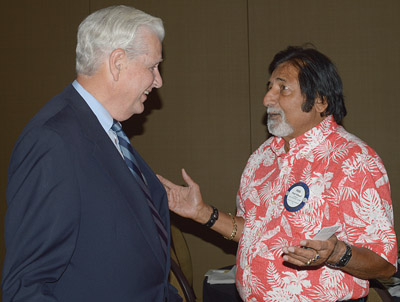Death penalty ex-state Supreme Court chief justice’s topic
 Gary R. Wade, left, LMU Law dean and former Tennessee Supreme Court chief justice, spoke to Rotary Club of Farragut member Paul Sehgal after Wade addressed the club as its featured speaker in Fox Den Country Club Wednesday afternoon, July 25.
Gary R. Wade, left, LMU Law dean and former Tennessee Supreme Court chief justice, spoke to Rotary Club of Farragut member Paul Sehgal after Wade addressed the club as its featured speaker in Fox Den Country Club Wednesday afternoon, July 25.
The death penalty is something different than what he usually talks about, Wade told Rotary Club of Farragut members during RCF’s meeting in Fox Den Country Club Wednesday, July 24.
“I will just lay out the facts, and you can decide for yourself about the propriety of that,” said Wade, now the dean and vice president of Lincoln Memorial University Dutton School of Law.
“We all heard the term ‘an eye for an eye, a tooth for a tooth,’ and I remembered it as Biblical — the Old Testament,” he added.
Upon further study, however, Wade learned the term came from the Babylonian Code of Hammurabi, written about 500 years before Exodus.
“So, if you’re an Old Testament Biblical scholar … I think it puts a Biblical blessing on the death penalty as a result of a major crime. “On the other hand, if you’re a New Testament person, you remember the Sermon on the Mount in the Book of Matthew, where Jesus Christ warns those assembled to … turn the other cheek,” Wade said.
“And, this pretty much reflects the attitude of most Americans today to the death penalty and capital punishment in general,” he added.
Thirty-one states have the death penalty, but Wade said governors in four of those states declared a moratorium.
Tennessee has always had capital punishment since its origin, he said.
“When we were part of the North Carolina territory, between 1782 and 1796, there were 10 executions,” Wade said.
From 1796, to 1960, Tennessee had 507 executions, but there was not another execution in the state until 2000.
Wade explained a law case, Thurman vs. Georgia, in the 1960s told all states to reserve the death penalty for “the worst of the worst.
“In Tennessee, we have the two-tiered death penalty,” Wade added. The first tier is the trial to find guilt or innocence. Then, there is a second trial to determine the sentence —
life without parole or the death penalty.”
After the imposition of death, Wade said all appeals to Tennessee Supreme Court must be exhausted, followed by a post-conviction process to test the propriety of the accused’s counsel.
“So often, it’s three, four, five years before a case goes throughboth of those processes,” he said.
Then, cases can go to the federal court through habeas corpus. “For years, there was an unlimited number of challenges you could make (at the U.S. Supreme Court level),” Wade said.
“So, it’s relatively easy for a federal judge sitting in a district court with authority over death penalty cases to simply decide not to decide.”
“Judge Gary Wade has a very impressive background,” said RCF vice president Staci Wilkerson as she introduced the speaker.
Wade was appointed to Tennessee Supreme Court in 2006, where he served as chief justice from September 2012 until August 2014.
Before that, he served on the Court of Criminal Appeals for 19 years as presiding judge, was in private practice for 15 years and was mayor of Sevierville for 10 years.
Wade retired from the Supreme Court in July 2015, and shortly thereafter accepted an offer to become dean and vice president at LMU’s law school.


